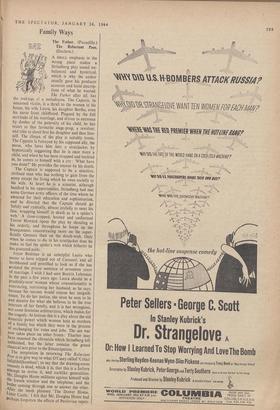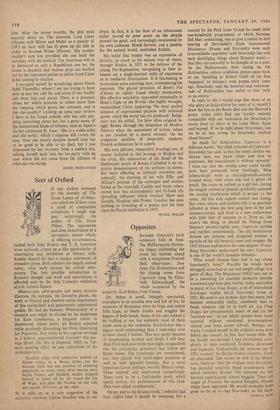Family Ways The Father. (Piccadilly.) The Reluctant Peer. (Duchess.) A
SMALL emphasis in the wrong place makes a Strindberg play sound un- balanced and hysterical, which is why the author usually gave his producer accurate and lucid descrip- tions of what he wanted. The Father after all, has the makings of a melodrama. The Captain, its unnamed victim, is a thrall to the women in his house, his wife Laura, his daughter Bertha, even his nurse from childhood. Plagued by the full servitude of his marriage, and driven to extremes by doubts of the paternity of his child, he has resort to that favourite stage-prop, a revolver, and tries to shoot first his daughter and then him- self. The climax of the play is suitably ironic. The Captain is betrayed by his supposed ally, the nurse, who lures him into a straitjacket by hypnotically suggesting that he is once more a child, and when he has been strapped and buckled in, he comes to himself with a cry : 'What have you done?' He provides the answer by his death.
The Captain is supposed to be a sensitive, civilised man who has nothing to gain from the army except the living which he owes socially to his wife. At heart he is a scientist, although baulked in his opportunities. Strindberg had met some German army officers of the time whom he admired for their education and sophistication, and he directed that the Captain should go 'loftily and cynically, almost joyfully to meet his fate, wrapping himself in death as in a spider's web.' A close-cropped, booted and uniformed Trevor Howard opens the play by shouting at his orderly, and throughout he keeps up the brusqueness, concentrating more on the super- ficially German than on the death-wish. Only when he comes to die in his straitjacket does he make us feel the spider's web which hitherto he has postured aside.
Joyce Redman is an unhelpful Laura who seems to have tripped out of Carousel, and all beribboned and prettified to look as if she has , avoided the prison sentence of seventeen years of marriage. I wish I had seen Beatrix Lehmann in the part a few years ago. Laura should be a prudishly-sour woman whose conventionality is convincing, restraining her husband, as he says, because his success would expose her insignifi- cance. To do her justice, she must be seen to lie and deceive for what she believes to be the true interests of her family, and it is her wrongness, not some feminine arbitrariness, which makes for the tragedy. At bottom this is a play about the old domestic power which women held as mothers of a family but which they were in the process of exchanging for votes and jobs. The sex war now takes place on other fronts: Thurber may have resumed the chronicle which Strindberg left unfinished, but the latter remains the grand Classical text prior to the Emancipation.
The temptation in reviewing The Reluctant Peer is to give way to what O'Casey called 'Critici Infallibilibombast'; to say that the drawing-room Comedy is dead, which it is, that this is a forlorn attempt to revive it, and suchlike generalities. Mr. Douglas Home militates against himself with the french window and the telephone, and the butler coming through one to answer the other. After the tenth plummy The Dower House, Lister Castle,' 1 felt that Mr. Douglas Home had Perhaps forgotten the effects of Pavlovi9 repeti-
tion. After the recent months, the plot need scarcely delay us. The sixteenth Lord Lister (rhymes with Blister and Mister as a parody of TW3 on their telly has it) gives up his title in order to become Prime Minister. His mother couldn't care lcss provided she can back the certainty with the bookies. The American wife is as dismayed as only a Republican can be; the butler is shocked, and various ploys are worked out by the interested parties to defeat Lord Lister in his coming by-election.
I occupied myself by wondering about Dame Sybil Thorndike, whom I am too young to have seen in any but odd fits and starts (I can hardly call them bits and parts). There is a presence about her which amounts to rather more than the clapping which greets her entrance, and is this star-quality? Looking up some past reviews I have so far found nobody who has said any- thing interesting about her, but a great many of the institutional kinds of tributes, such as Agate's on her celebrated St. loan: 'She is a noble artist and did nobly,' which I suppose still covers the case. Now she mostly imitates herself (one has to be good to be able to do that), but I was impressed by her recovery from a sudden dry, talking herself back into the tea-party with an ease which did not come from the silliness of what she was saying.
DAVID PRYCE-JONES



































 Previous page
Previous page